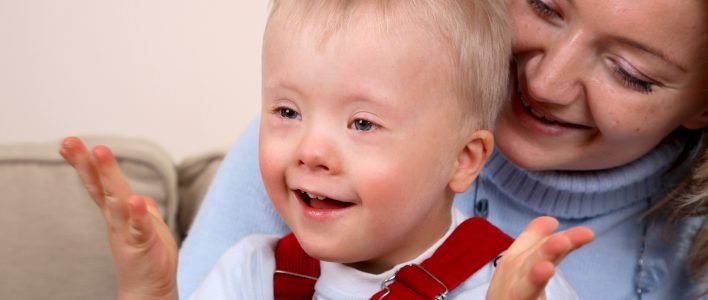Reflections on a discussion evening organized by the Upper Austria self-help group "Live with DS", on the subject "Siblings of disabled children", by Ingrid Kolnberger; to guest: Karin Böhmler, Early intervention, has a sister with DS who is 2 years older, study on the situation of siblings and children with disabilities Elisabeth Weissengruber, Diakoniewerk Gallneukirchen, has a sister with DS who is 15 years younger
We started with that book ". and nobody cares about me" by Ilse Archilles (see literature / siblings) in which the situation of the siblings of disabled children is shown.
In her research, Ilse Archilles found that dealing with a disabled sibling has an impact on the lives of other children.
There are a number of Factors that are decisive for how a sibling feels, whether it .
- let down
- overwhelmed or
- feels set back
- suffers from the disability of his sister / brother
- Has difficulties in partnership or work or
- socially competent
- mature
- more balanced or
- becomes more resilient
- or experienced the disability of his brother / sister as an enrichment in the family.

In her book she shows sources of danger and sources of power that have a very significant impact on development.
hazards
Because of a disabled sibling, many are early faced with suffering and experience that it is not a matter of course to be healthy and not to receive help with everyday activities.
Again and again it happens that the Environment not positive towards disabled people. Our guests reported that they still experience that their brother / sister is being excluded or discriminated against from society today.
Siblings can often or may be present to the brother or sister Do not openly express negative feelings such as anger, aggression or jealousy. Instead, you will be understanding and considerate required. This creates feelings of guilt (I’m better, healthier, prettier, smarter) and can reduce the joy of life. Some then formally sacrifice themselves for their disabled sibling and overwhelm themselves. At the other extreme, they distance themselves because they no longer want to endure the stress.
Because of the constant "Consideration" to the problem child in the family it can happen that others Siblings neglected become (financially, with "affection", in the form of help with school assignments etc.).
Sometimes the siblings Sibling success experienced differently. It is important to note the order in which the disabled sibling was born. Karin Böhmler reported that she fought when she became her sister physically and mentally "outdated" would have. At that time, she could not understand why this is so. First she saw her sister as tall, then as a person who needed her care. Today she is her older sister again.
It looks different when the disabled sibling is younger, as with Elisabeth Weissengruber. She didn’t experience it so blatantly, as it was always clear to her that it was the younger sister. The position within the row of siblings was already established.
power sources
Show the Parents a positive attitude to their lives and their child’s disabilities (together we will make it, even if it is difficult!), so the children can better cope with possible stress. It has a positive effect if honest discussions are held within the family and the children are informed. This will reduce unnecessary fears and prepare the children for the environment.
It also has a positive effect if parents ensure that Free space for siblings available. In this special time, the children should be able to pursue their hobbies alone or do something with friends. Of course, it is also important now and then Quality time with the parents to plan without having to focus on the sibling with disabilities and having the parents only for themselves. Sometimes a false pride on the part of the parents makes them shy away from using the help of others in order to create space for themselves.
Another source of power is when children have the opportunity to get, to talk to other confidants about the brother or sister and how they feel about him / her or possibly being allowed to educate classmates at school as part of the lesson
For Ilse Archilles it is Development of a sibling then succeeded, if .
- there is a predominantly positive attitude towards the disabled child
- you don’t have the feeling that you have to be there for the brother / sister all the time
- you can define yourself enough
- one is no longer ashamed in public
- you plan your own future regardless of your disabled sibling
- and if you have a predominantly positive self-image.
Elisabeth Weissengruber confirms that acceptance within the family is the best cornerstone for everyone’s development. The fact that Ms. Weissengruber and Ms. Böhmler found their professional activity in the area of the disabled is certainly due to their life with their sister. Both have up today never regretted their professional decision and would make the same decision again.
Our guests reported that they and their partners or children are still in good contact with their sisters with Down syndrome. Both do not experience the disabled sibling as a burden but as an enrichment in their lives.
RELATED ITEMS
-

Friends and siblings: social contacts among children
This article addresses the following questions: Why do children need friendships with other children? Contacts to peers in the…
-

Siblings strollers info and recommendation twins
The Adbor twin stroller duo sibling stroller With many young families, it is often the case that after the first offspring, this suddenly changes…
-

Mental disabilities – recognizing and promoting mentally disabled children
Mental disabilities usually mean considerable restrictions in cognitive, i.e. intellectual, abilities. Intellectual disabilities also limit that…
-

Desire to have children despite handicap (archive)
Society generally welcomes the fact that people will eventually want to have children. Get on the other hand…
